Abstract
Two bacteriocins (boticins) were elaborated without induction by strain S5, a nontoxigenic variant of Clostridium botulinum type E. After separation of the two active entities by gel filtration on Sephadex G-50, a large particle with boticin activity was isolated by density gradient ultracentrifugation, and a small soluble boticin was purified by continuous curtain electrophoresis and chromatography on sulfoethyl-Sephadex. Large and small boticins were purified 200- and 3,000-fold, respectively, with yields of 50% or more. The small boticin, a basic substance with molecular weight under 30,000, was the predominant species; the large boticin, a negatively charged particle with particle weight greater than 40 × 106, represented less than 20% of the total activity. Both purified boticins were resistant to heat and were attacked by proteolytic enzymes, but the large boticin was less thermostable and less sensitive to proteolytic enzymes than was the smaller variety. The activity of the large boticin was not reduced by treatment with urea or deoxyribonuclease. Both boticins exhibited sporostatic and bactericidal activities for C. botulinum type E, strain 070. A suspension of type E strain 070 vegetative cells was rendered nonviable within 9 min by the small boticin. The lethal action of this bacteriocin was not reversed by trypsin.
Full text
PDF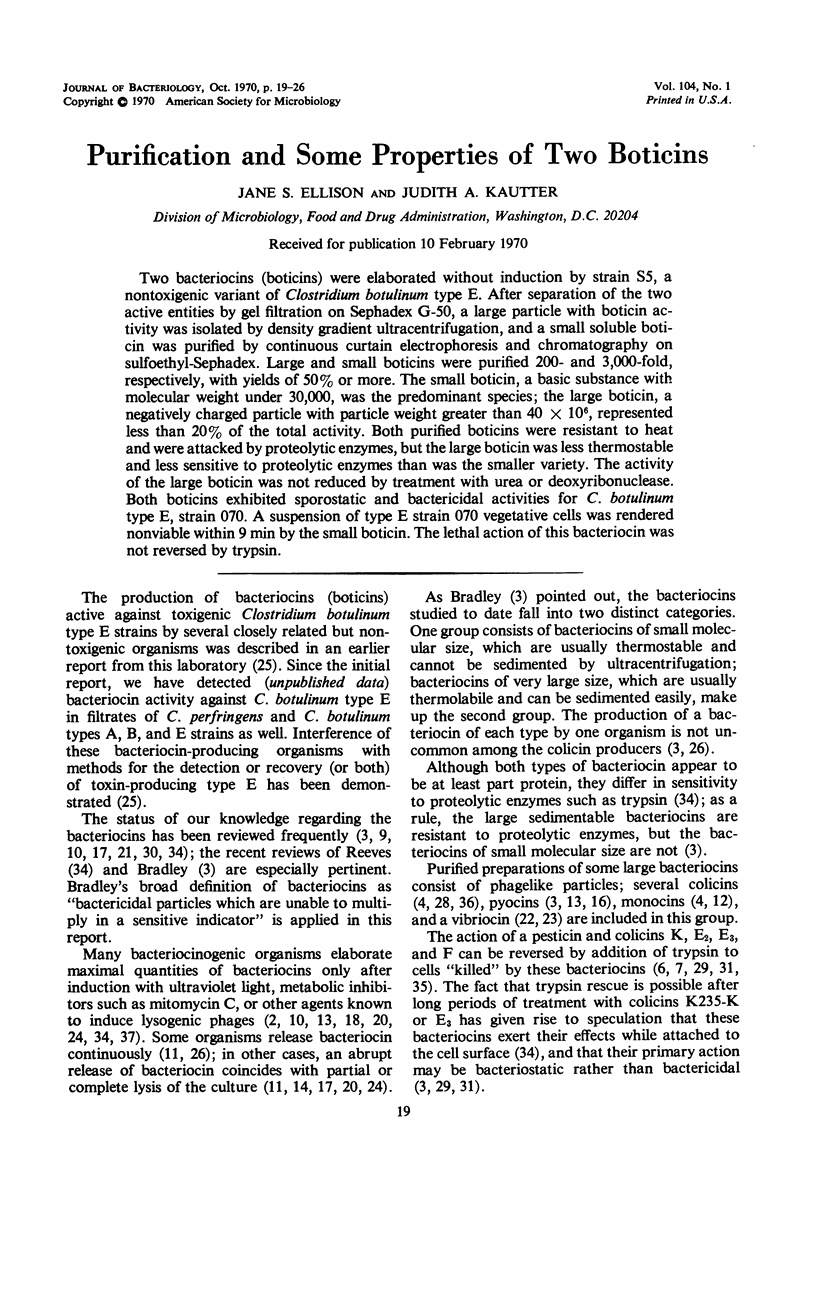
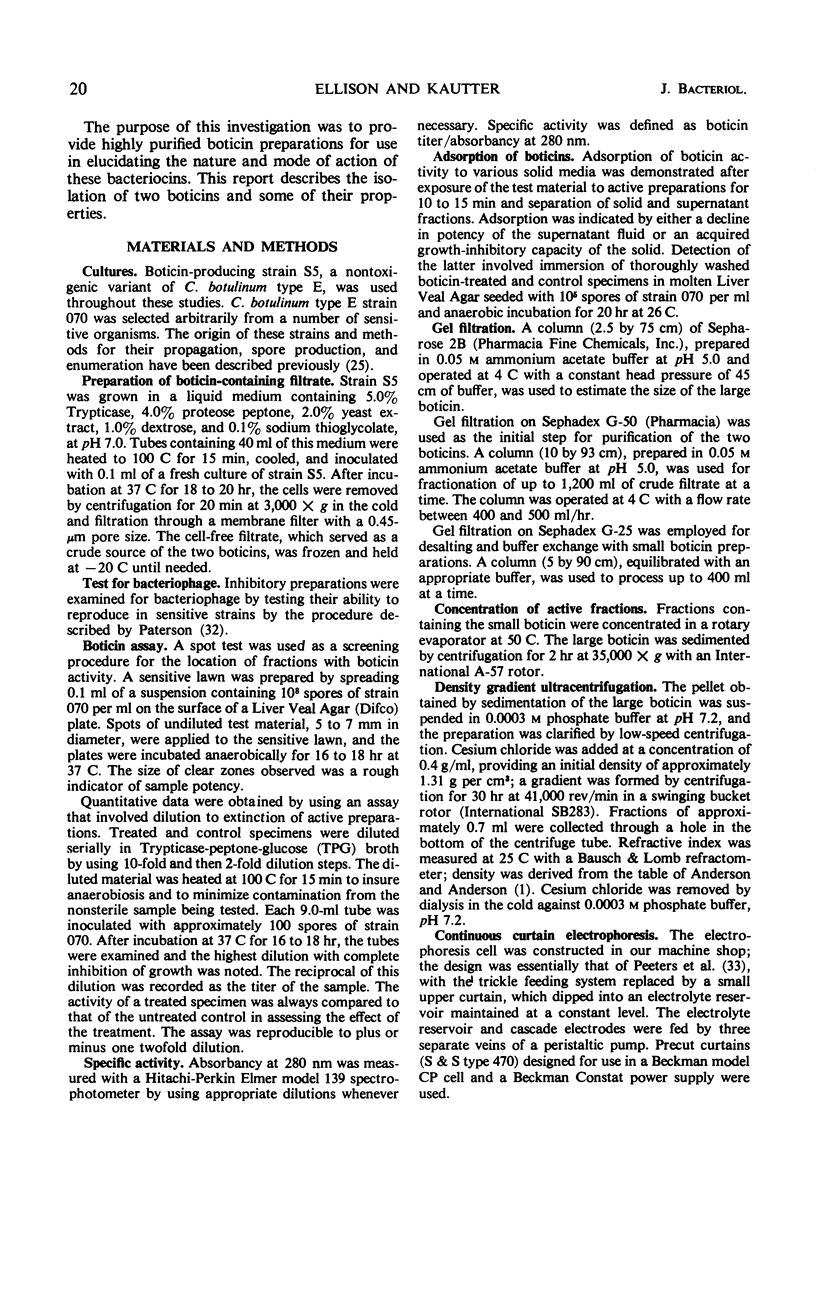
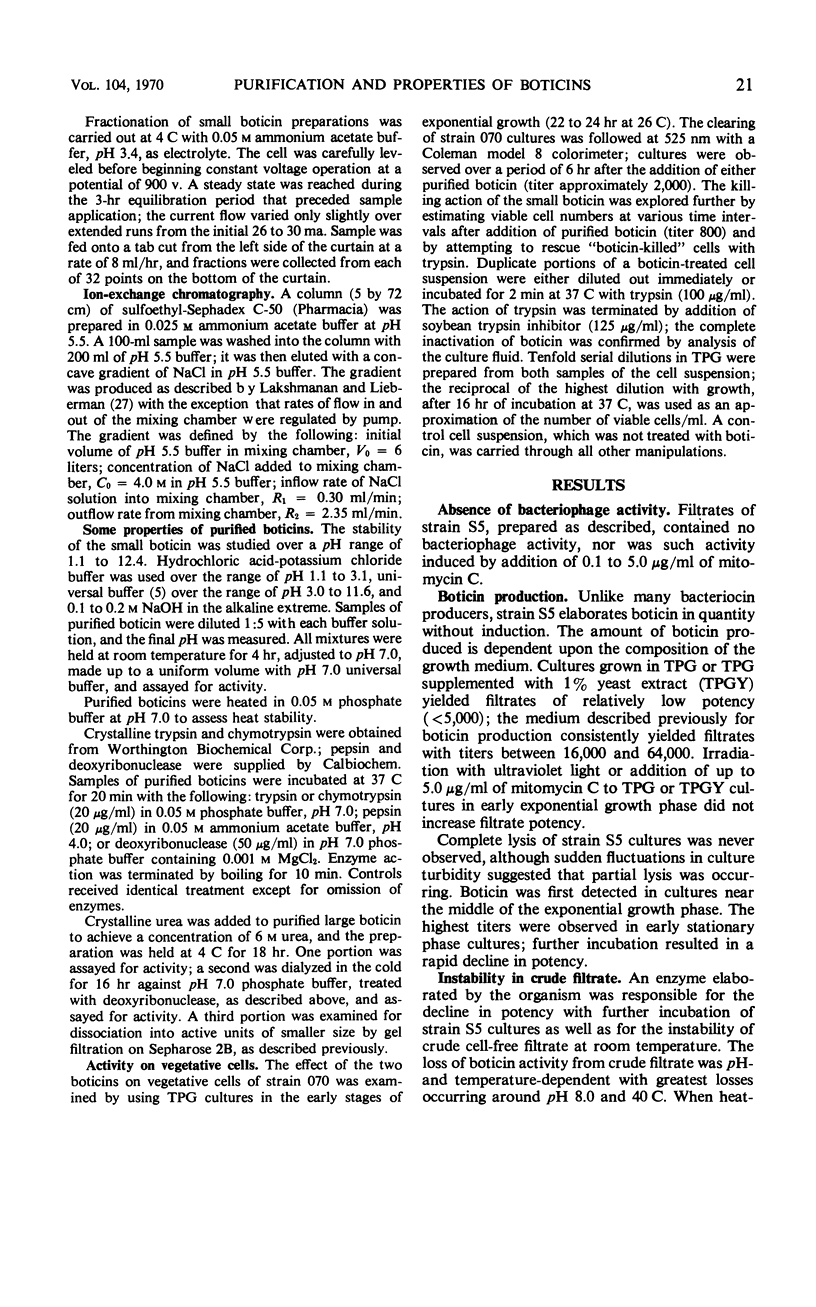
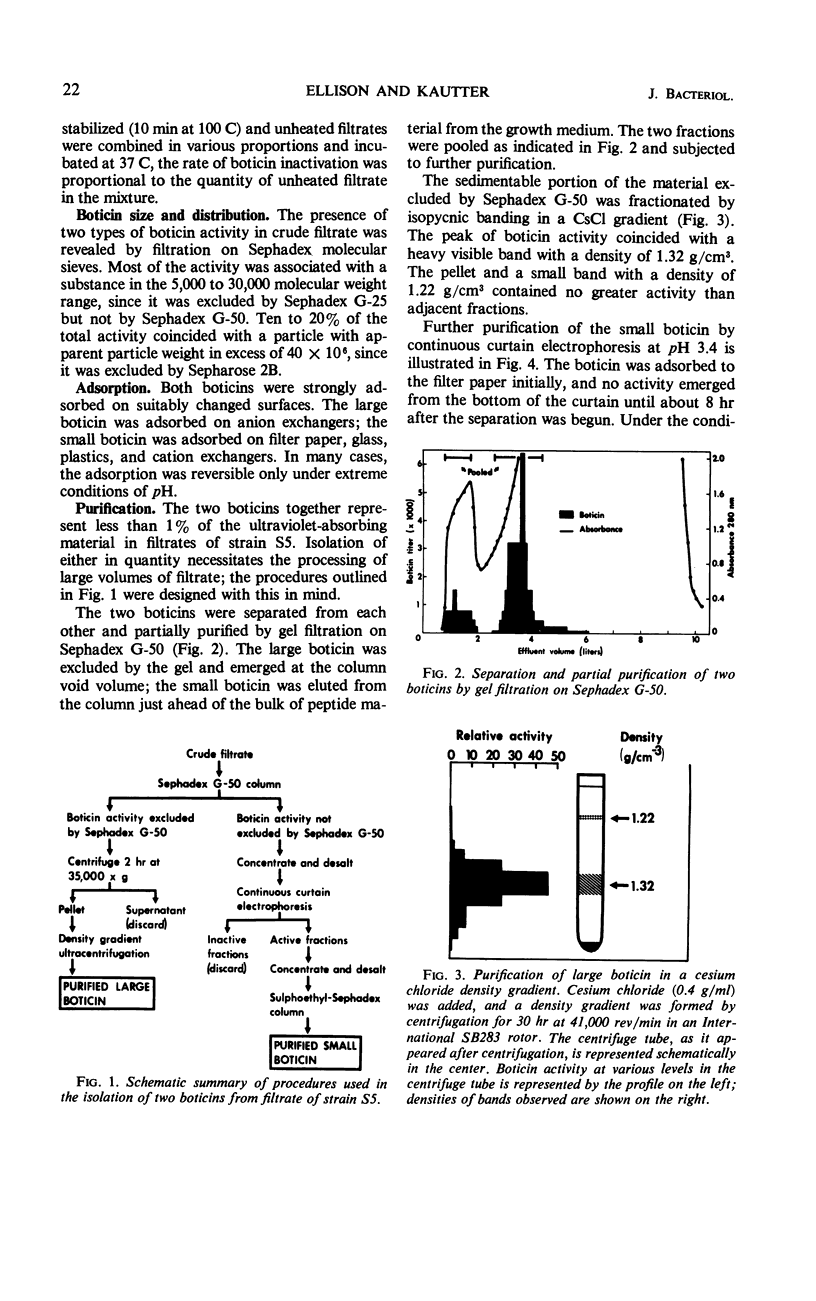
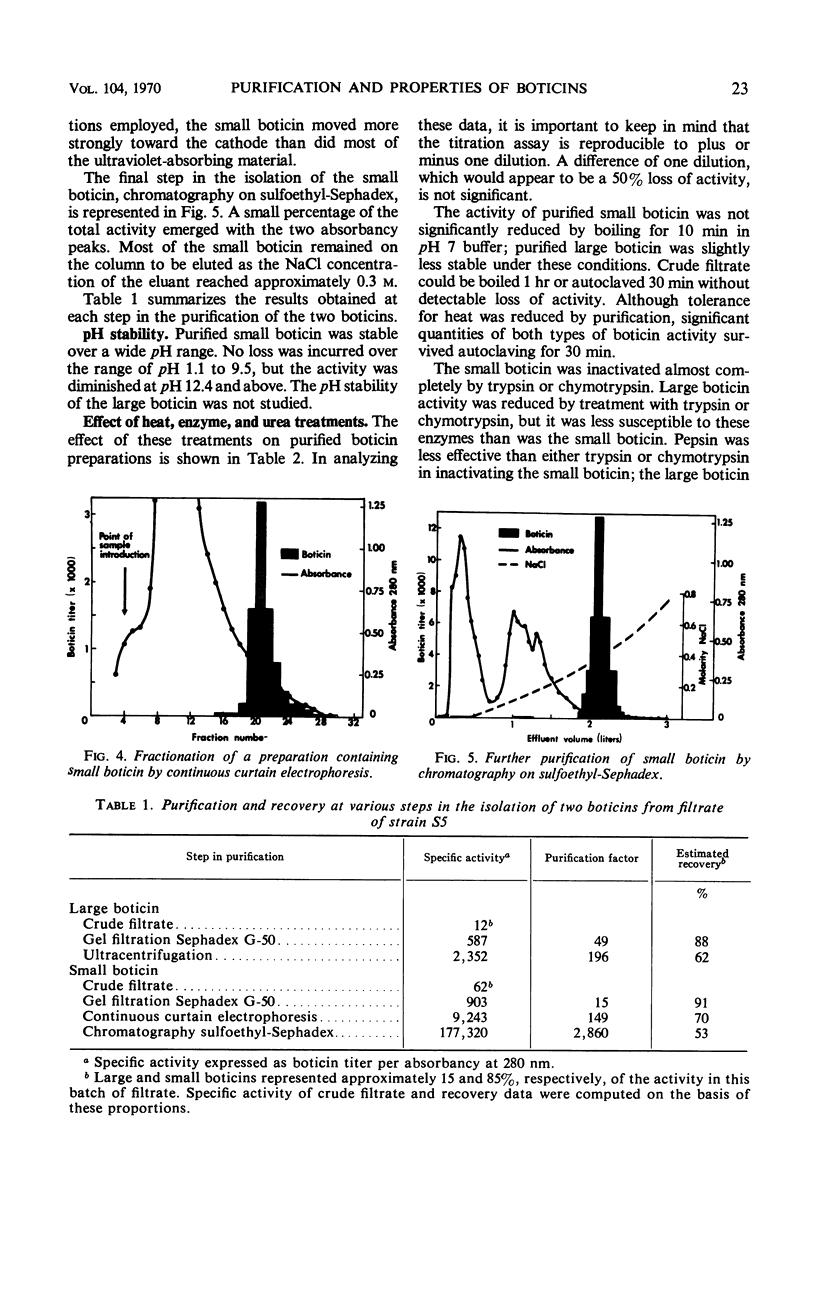
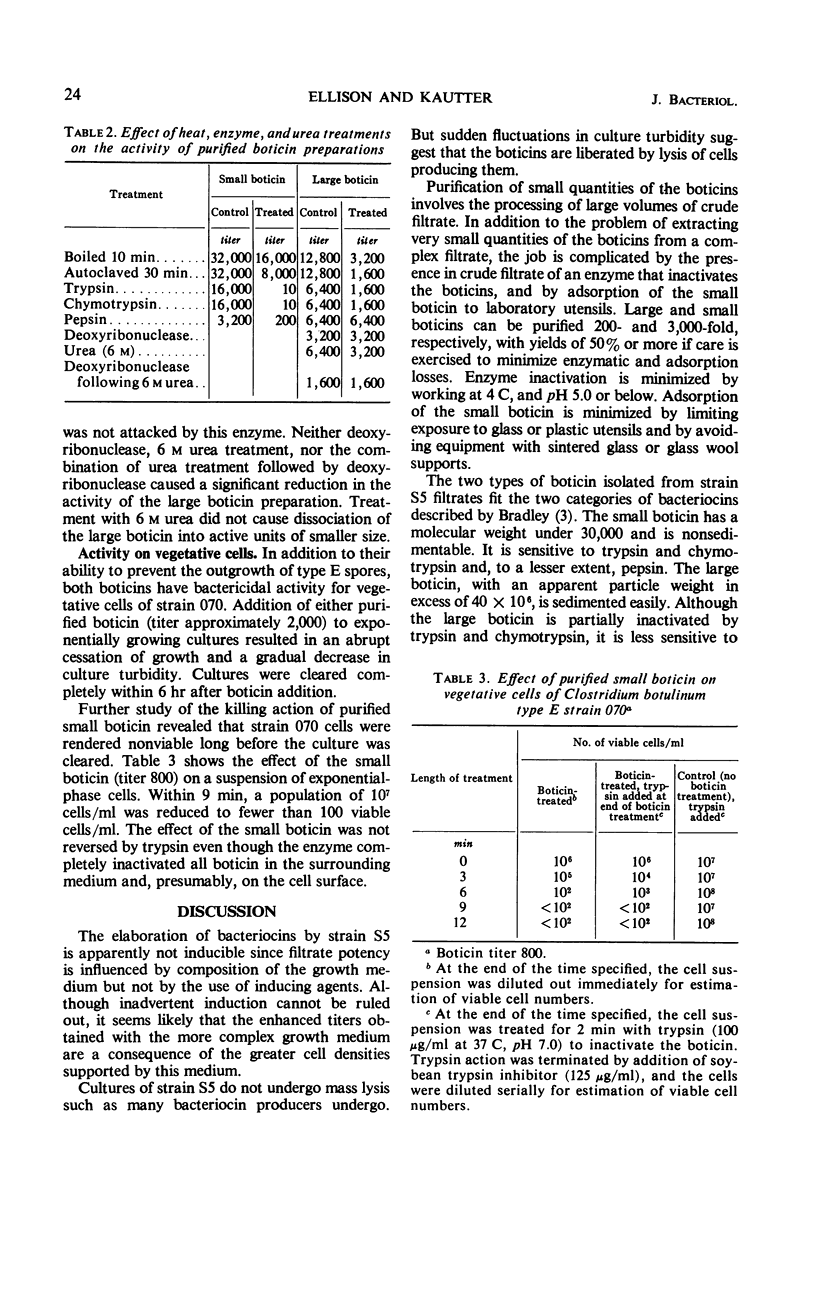
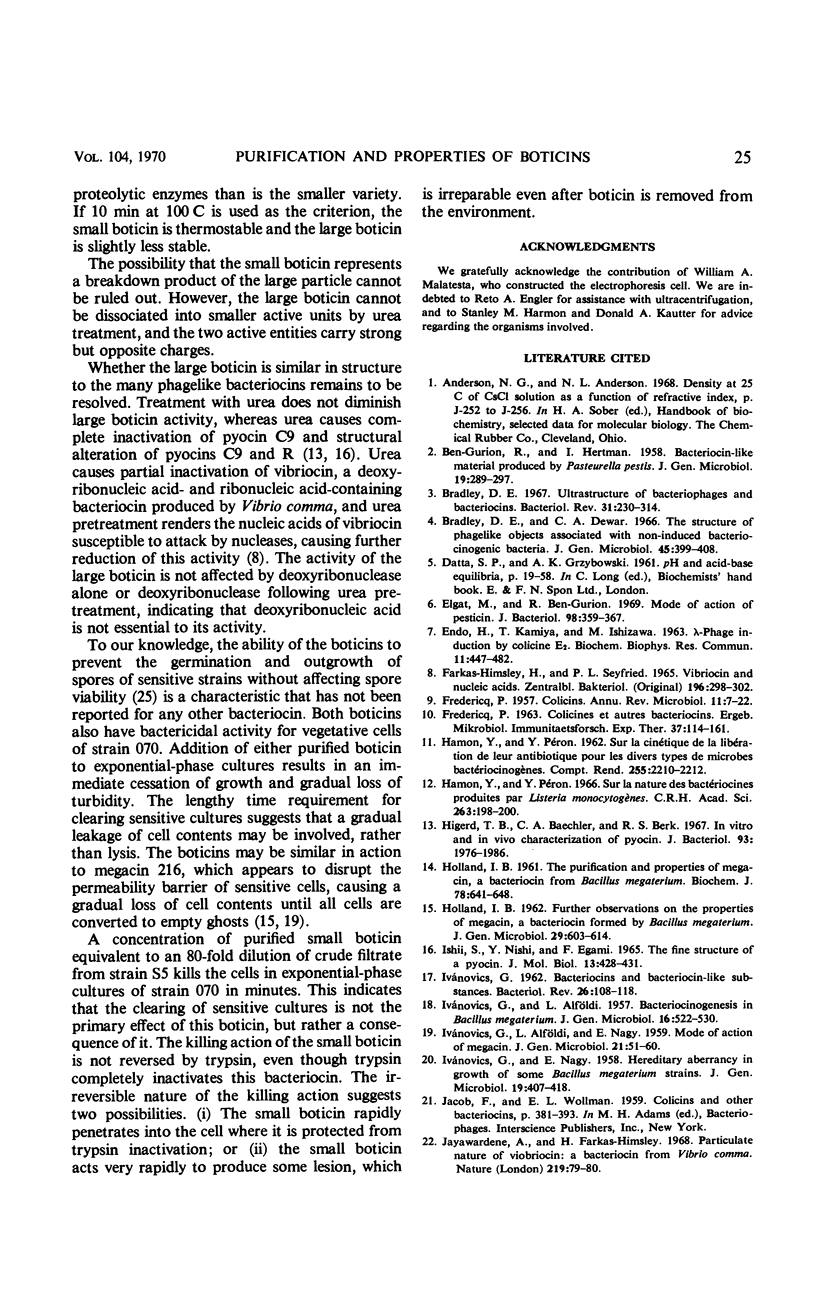
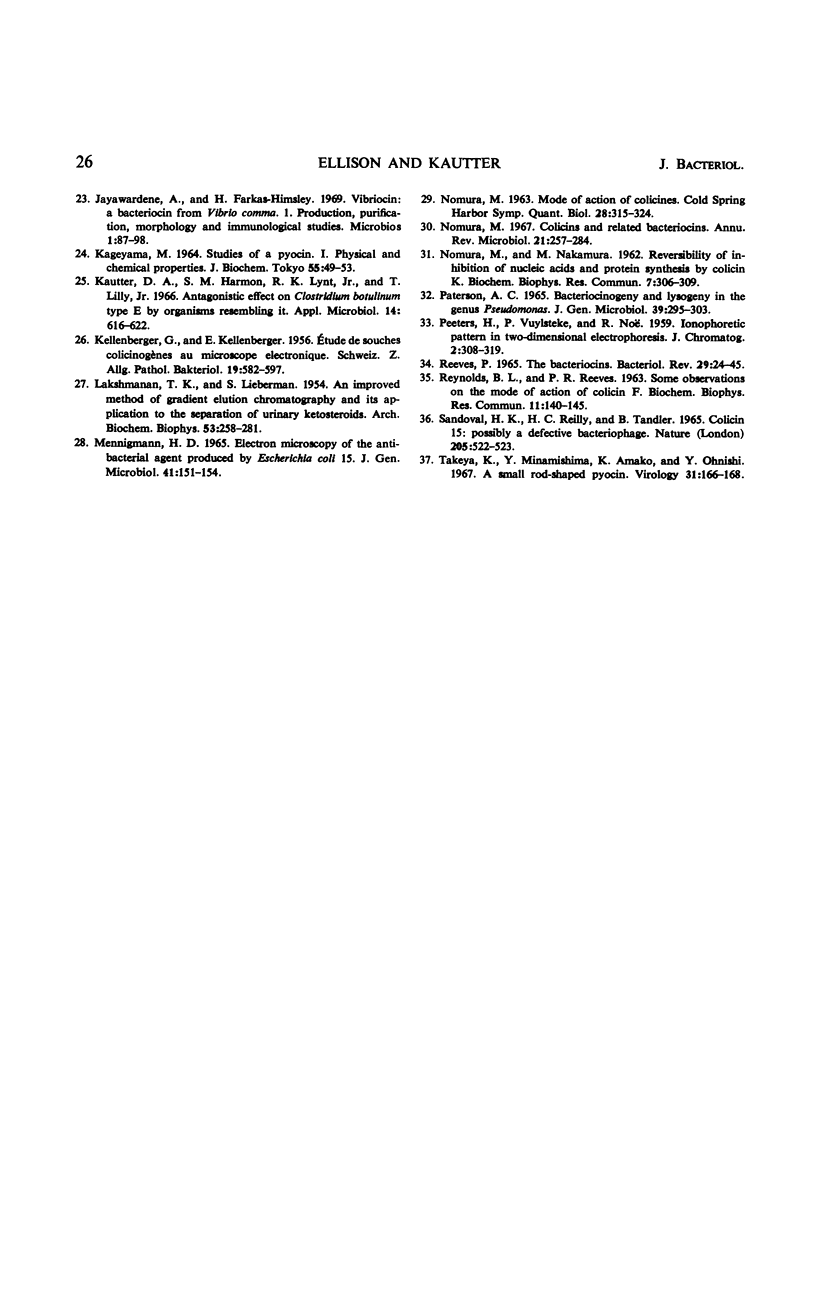
Selected References
These references are in PubMed. This may not be the complete list of references from this article.
- BEN-GURION R., HERTMAN I. Bacteriocin-like material produced by Pasteurella pestis. J Gen Microbiol. 1958 Oct;19(2):289–297. doi: 10.1099/00221287-19-2-289. [DOI] [PubMed] [Google Scholar]
- Bradley D. E. Ultrastructure of bacteriophage and bacteriocins. Bacteriol Rev. 1967 Dec;31(4):230–314. doi: 10.1128/br.31.4.230-314.1967. [DOI] [PMC free article] [PubMed] [Google Scholar]
- Elgat M., Ben-Gurion R. Mode of action of pesticin. J Bacteriol. 1969 May;98(2):359–367. doi: 10.1128/jb.98.2.359-367.1969. [DOI] [PMC free article] [PubMed] [Google Scholar]
- FREDERICQ P. COLICINES ET AUTRES BACTERIOCINES. Ergeb Mikrobiol Immunitatsforsch Exp Ther. 1963;37:114–161. [PubMed] [Google Scholar]
- FREDERICQ P. Colicins. Annu Rev Microbiol. 1957;11:7–22. doi: 10.1146/annurev.mi.11.100157.000255. [DOI] [PubMed] [Google Scholar]
- HAMON Y., PERON Y. [On the kinetics of the liberation of their antibotic by the various types of bacteriocinogenic microbes]. C R Hebd Seances Acad Sci. 1962 Oct 22;255:2210–2212. [PubMed] [Google Scholar]
- HOLLAND I. B. Further observations on the properties of megacin, a bacteriocine formed by Bacillus megaterium. J Gen Microbiol. 1962 Dec;29:603–614. doi: 10.1099/00221287-29-4-603. [DOI] [PubMed] [Google Scholar]
- HOLLAND I. B. The purification and properties of megacin, a bacteriocin from Bacillus megaterium. Biochem J. 1961 Mar;78:641–648. doi: 10.1042/bj0780641. [DOI] [PMC free article] [PubMed] [Google Scholar]
- Hamon Y., Péron Y. Sur la nature des bactériocines produites par Listeria monocytogenes. C R Acad Sci Hebd Seances Acad Sci D. 1966 Jul 11;263(2):198–200. [PubMed] [Google Scholar]
- Higerd T. B., Baechler C. A., Berk R. S. In vitro and in vivo characterization of pyocin. J Bacteriol. 1967 Jun;93(6):1976–1986. doi: 10.1128/jb.93.6.1976-1986.1967. [DOI] [PMC free article] [PubMed] [Google Scholar]
- IVANOVICS G., ALFOLDI L. Bacteriocinogenesis in Bacillus megaterium. J Gen Microbiol. 1957 Jun;16(3):522–530. doi: 10.1099/00221287-16-3-522. [DOI] [PubMed] [Google Scholar]
- IVANOVICS G., ALFOLDI L., NAGY E. Mode of action of megacin. J Gen Microbiol. 1959 Aug;21:51–60. doi: 10.1099/00221287-21-1-51. [DOI] [PubMed] [Google Scholar]
- IVANOVICS G., NAGY E. Hereditary aberrancy in growth of some Bacillus megaterium strains. J Gen Microbiol. 1958 Oct;19(2):407–418. doi: 10.1099/00221287-19-2-407. [DOI] [PubMed] [Google Scholar]
- Ishii S. I., Nishi Y., Egami F. The fine structure of a pyocin. J Mol Biol. 1965 Sep;13(2):428–431. doi: 10.1016/s0022-2836(65)80107-3. [DOI] [PubMed] [Google Scholar]
- Ivanovics G. BACTERIOCINS AND BACTERIOCIN-LIKE SUBSTANCES. Bacteriol Rev. 1962 Jun;26(2 Pt 1):108–118. [PMC free article] [PubMed] [Google Scholar]
- Jayawardene A., Farkas-Himsley H. Particulate nature of vibriocin: a bacteriocin from Vibrio comma. Nature. 1968 Jul 6;219(5149):79–80. doi: 10.1038/219079a0. [DOI] [PubMed] [Google Scholar]
- KAGEYAMA M. STUDIES OF A PYOCIN. I. PHYSICAL AND CHEMICAL PROPERTIES. J Biochem. 1964 Jan;55:49–53. doi: 10.1093/oxfordjournals.jbchem.a127839. [DOI] [PubMed] [Google Scholar]
- KELLENBERGER E., KELLENBERGER G. Etude de souches colicinogènes au microscope électronique. Schweiz Z Pathol Bakteriol. 1956;19(5):582–597. [PubMed] [Google Scholar]
- Kautter D. A., Harmon S. M., Lynt R. K., Jr, Lilly T., Jr Antagonistic effect on Clostridium botulinum type E by organisms resembling it. Appl Microbiol. 1966 Jul;14(4):616–622. doi: 10.1128/am.14.4.616-622.1966. [DOI] [PMC free article] [PubMed] [Google Scholar]
- LAKSHMANAN T. K., LIEBERMAN S. An improved method of gradient elution chromatography and its application to the separation of urinary ketosteroids. Arch Biochem Biophys. 1954 Nov;53(1):258–281. doi: 10.1016/0003-9861(54)90250-7. [DOI] [PubMed] [Google Scholar]
- Mennigmann H. D. Electron microscopy of the anti-bacterial agent produced by Escherichia coli 15. J Gen Microbiol. 1965 Nov;41(2):151–154. doi: 10.1099/00221287-41-2-151. [DOI] [PubMed] [Google Scholar]
- NOMURA M., NAKAMURA M. Reversibility of inhibition of nucleic acids and protein synthesis by colicin K. Biochem Biophys Res Commun. 1962 May 4;7:306–309. doi: 10.1016/0006-291x(62)90196-1. [DOI] [PubMed] [Google Scholar]
- Nomura M. Colicins and related bacteriocins. Annu Rev Microbiol. 1967;21:257–284. doi: 10.1146/annurev.mi.21.100167.001353. [DOI] [PubMed] [Google Scholar]
- Paterson A. C. Bacteriocinogeny and lysogeny in the genus Pseudomonas. J Gen Microbiol. 1965 Jun;39(3):295–303. doi: 10.1099/00221287-39-3-295. [DOI] [PubMed] [Google Scholar]
- REEVES P. THE BACTERIOCINS. Bacteriol Rev. 1965 Mar;29:24–45. doi: 10.1128/br.29.1.24-45.1965. [DOI] [PMC free article] [PubMed] [Google Scholar]
- REYNOLDS B. L., REEVES P. R. Some observations on the mode of action of colicin F. Biochem Biophys Res Commun. 1963 Apr 23;11:140–145. doi: 10.1016/0006-291x(63)90081-0. [DOI] [PubMed] [Google Scholar]
- SANDOVAL H. K., REILLY H. C., TANDLER B. COLICIN 15: POSSIBLY A DEFECTIVE BACTERIOPHAGE. Nature. 1965 Jan 30;205:522–523. doi: 10.1038/205522a0. [DOI] [PubMed] [Google Scholar]
- Takeya K., Minamishima Y., Amako K., Ohnishi Y. A small rod-shaped pyocin. Virology. 1967 Jan;31(1):166–168. doi: 10.1016/0042-6822(67)90021-9. [DOI] [PubMed] [Google Scholar]
- WILT F. H. The synthesis of ribonucleic acid in sea urchin embryos. Biochem Biophys Res Commun. 1963 Jun 20;11:447–451. doi: 10.1016/0006-291x(63)90090-1. [DOI] [PubMed] [Google Scholar]


